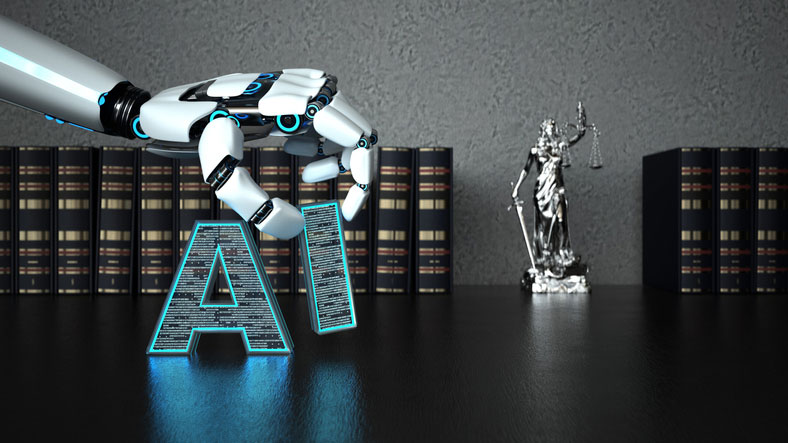Written by Scott Wilson

You saw the same headlines as everyone else: a New York lawyer who relied on ChatGPT to write a motion for the court which turned out to be filled with entirely made-up citations and was fined $5,000. Or the one in Colorado who was fired for the same thing. Or the fake cases Google Bard provided to Michael Cohen, one-time attorney for Donald Trump, in his own legal travails.
It’s been enough of an issue that Supreme Court Chief Justice John Roberts, in his annual year-end report on the American judiciary, urged caution in how the new technology is used for legal matters.
AI has come to the legal world before anyone was ready for it.
But all those big fails don’t mean that AI doesn’t have a valuable role to play in the world of lawyers and paralegals. As a profession that is rooted in words and reasoning, it’s a perfect fit for the new abilities in natural language processing (NLP) and logic that are emerging from developments in AI.
All that’s missing now are the specialist professionals to make sure that artificial intelligence can follow the letter of the law in American jurisprudence.
The Legal System in the United States Is Under Pressure
 The legal system is the vital underpinning to a just and equitable society. Law governs the most basic interactions of individuals and corporations. It protects, defends, and elevates our rights; it offers resolutions to thorny difficulties in areas of social interaction, criminal behavior, and commerce.
The legal system is the vital underpinning to a just and equitable society. Law governs the most basic interactions of individuals and corporations. It protects, defends, and elevates our rights; it offers resolutions to thorny difficulties in areas of social interaction, criminal behavior, and commerce.
But it’s a system that has been showing the strain of a growing and divided society. The U.S. courts are among the busiest in the world. The right to a trial by jury is fundamental in our system, but it also creates systemic organizational difficulties in conducting trials. The ongoing piles of conflicting caselaw from various parts of the country require thousands of hours for lawyers to parse.
The result is, according to the American Bar Association, enormous delays and backlogs. Almost 80 percent of lawyers reported delays in hearing schedules; 70 percent found courts faced workforce shortages. The right to a speedy trial, as guaranteed in the Constitution, is all but abandoned: the average time to disposition for a felony case in stretched to 256 days according to a 2021 report by the National Center for State Courts.
How Artificial Intelligence Can Assist the Legal System in Faster and More Equitable Work
 AI is offering all kinds of efficiency improvements in almost every industry. Even though the law is a very specialized field, with much at stake, there’s no difference here.
AI is offering all kinds of efficiency improvements in almost every industry. Even though the law is a very specialized field, with much at stake, there’s no difference here.
In fact, AI has already made its way into some aspects of legal and paralegal work. The quick work that NLP algorithms can make of vast stacks of data makes it ideal for use in legal research. Some services, like Bloomberg Law’s Brief Analyzer, will go over paperwork prepared by humans and evaluate cited sources, suggest cross-references, and potentially surface additional relevant cases that strengthen the briefing.
Similar uses for improving docket searches, evaluating prior decisions, and even proofing laws and regulations before they go on the books are on the horizon. E-discovery will also become increasingly useful. As more and more relevant information is buried in databases or vast non-traditional data stores, AI can make short work of combing through it to pull out relevant information.
AI may be used for litigation analysis and to suggest strategies at trial. It may also perform more intensive and thorough due diligence processes than a whole team of human lawyers.
Despite the disasters unleashed by ChatGPT on legal document preparation, there will also soon come a time when more carefully prepared specialist legal AI is turned loose to draft contracts, briefs, motions, and other legal documents on its own. Such systems will have the benefit of learning from millions of existing documents and tapping into generative algorithms to ensure that every i is dotted and every T is crossed.
Finally, specialized AI will be used in all the basic document-handling and generation tasks that every kind of office runs on. Chatbots will greet clients at law firm websites, quickly categorize them, and even perform an initial analysis and data gathering before turning them over to a paralegal or lawyer.
Artificial Intelligence Promises to Remove Speed Bumps in the Justice System
 While all these uses can speed up legal work, there are other benefits that come along with them. The more expansive nature of AI searches for evidence will also make for a more just legal system. The relevance and equitability of decisions in the American system rests on clear and accurate information being presented at trial.
While all these uses can speed up legal work, there are other benefits that come along with them. The more expansive nature of AI searches for evidence will also make for a more just legal system. The relevance and equitability of decisions in the American system rests on clear and accurate information being presented at trial.
While AI algorithms can inherit biases from their creators and training material, they can also eliminate some of the known biases that come with human agents.
Consistency in decisions can come from machines who are programmed to have no skin in the game.
Further, with AI able to develop quick and coherent legal perspectives, and to gather information independently, there’s a good chance better legal services will be available to more people at lower cost. With an AI handling intake processes, law firms can scope more cases, offer more advice, and do it with less human attention.
Of course, ethical considerations are going to be huge in legal uses of artificial intelligence. AI professionals pursuing careers in this field will be held to higher standards. There are thorny problems to be worked out, and AI researchers and theorists will have to weigh in.
What Kind of Jobs Will Come with the Introduction of AI to Lawyers and Paralegals?
 At least initially, AI scientists will continue to be front and center as they work out ways to integrate information and deal with the hallucination problem—a stone-cold killer for any kind of trustworthy generative system in law.
At least initially, AI scientists will continue to be front and center as they work out ways to integrate information and deal with the hallucination problem—a stone-cold killer for any kind of trustworthy generative system in law.
AI engineers are also already on the job, working primarily at big legal service providers. They’ll be crafting the backend systems that outsource many AI services to law firms around the country.
There are also positions at major corporations developing AI that focus on the law. Particularly in the social media area, big companies have many compliance and discovery issues that AI can help overcome. Since they are already investing in the field in a big way, adapting that technology to their legal needs is an easy choice.
AI trainers and prompt engineers will also see heavy demand in law and paralegal AI development. Extra diligence will be needed to get chatbots to deliver accurate responses. That will take professionals who know the ins and outs of the deep neural networks behind them.
Finally, individual law firms will likely hire AI specialists to advise, implement, and maintain their own systems. These may not require the advanced qualifications for other roles. In fact, they may well be filled by existing staff with IT backgrounds who beef up their credentials with AI certificates or other training.
Standard AI Degrees Will Get You Started Working on AI in the Law
 As important as legal applications of artificial intelligence and machine learning will be, you won’t find any degree programs that focus on the area. While an understanding of logic and court procedure is a big deal for AI professionals working in law and paralegal uses, most of the education offered by law schools isn’t about that.
As important as legal applications of artificial intelligence and machine learning will be, you won’t find any degree programs that focus on the area. While an understanding of logic and court procedure is a big deal for AI professionals working in law and paralegal uses, most of the education offered by law schools isn’t about that.
So it’s easy to get started in legal AI with a Master of Science in Artificial Intelligence or a Master of Science in Machine Learning degree.
While most of the positions in the initial R&D phase of AI in the legal field will go to people with master’s or doctoral degrees, a lot of the later interface programming, training, analysis, and prompt engineering jobs will be wide open to anyone with the right undergraduate degree. A Bachelor of Arts in Artificial Intelligence is the perfect choice for these types of positions.
At the bachelor’s level, it’s a good idea to use the breadth of elective options to increase understanding of legal processes and practices. Even just a few basic Introduction to American Law, Criminal Justice, or Law, Science, and Technology classes can help set the stage for better integration of AI processes with the legal system.
For technical lawyers, or for computer science professionals who have a degree in an AI-adjacent field, educational certificates offer another option. These programs run for less than a year and cost only a small part of the total it would take to earn a full degree. In return, they come with a small selection of classes that build on existing expertise.
Assuming your coding, stats, and math skills are up to par, you can earn a Graduate Certificate in Artificial Intelligence to get your AI knowledge up to speed for work in the legal field.
Choice of School Is Particularly Important to Get a Grounding in AI for Legal Work
 While the exact degree required for jobs in this field may not be critical, picking the right school could be.
While the exact degree required for jobs in this field may not be critical, picking the right school could be.
A university with an active, well-respected law school is certainly going to be your best choice. You may not need to become any kind of legal expert to work in this field, but you will do better with access to the basic courses.
Further, many of the new developments in using AI for legal matters are being pioneered in these schools. A degree from a university with a reputation for cutting edge legal technology will always go further in the field, just law graduating from the right law school opens doors.
Is Professional Certification Available for AI Experts in Law and Paralaw?
Professional certification is a big part of technology jobs, and artificial intelligence is no exception. Many AI and ML certifications exist to offer validation from independent third parties of a candidate’s skills and knowledge.
While any of those may be useful to AI professionals, when it comes to law, most certifications are running in the other direction: those aimed at lawyers whose practices are impacted by AI. But most of these deal with AI on the legal, rather than the technical level.
Lawyers, in that sense, are going to be taking on AI in at least two different realms. But with the right experts to develop accurate and effective legal AI software systems, the entire profession will benefit.

